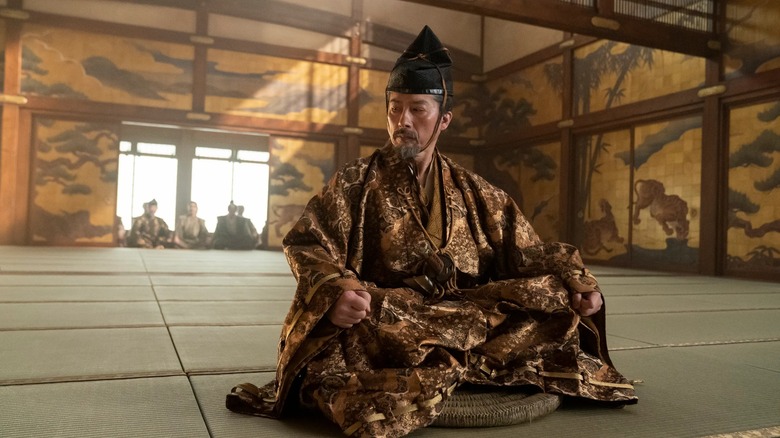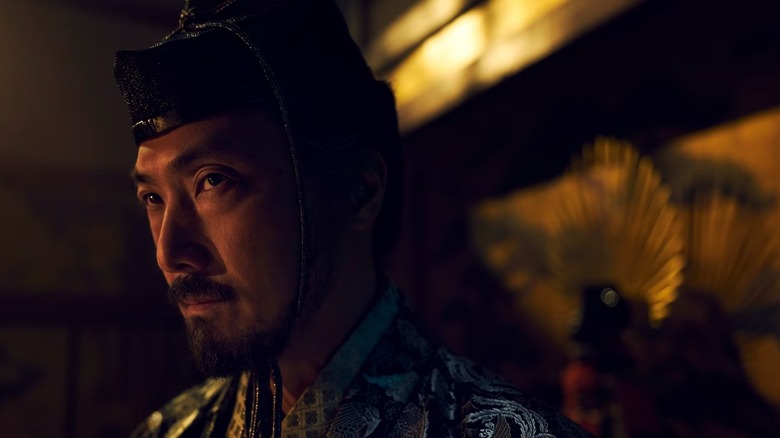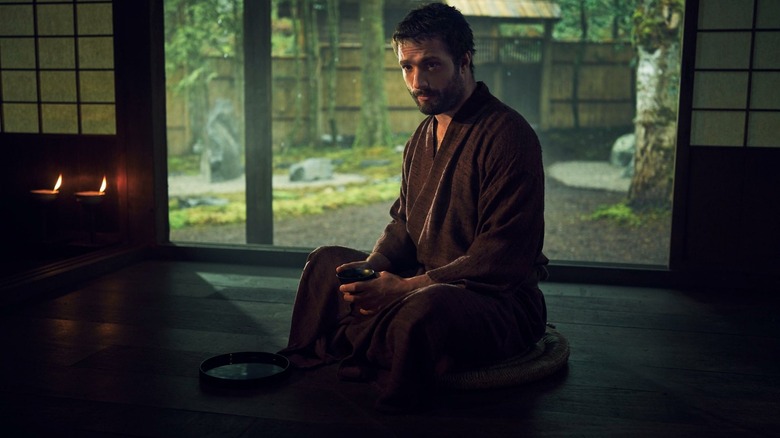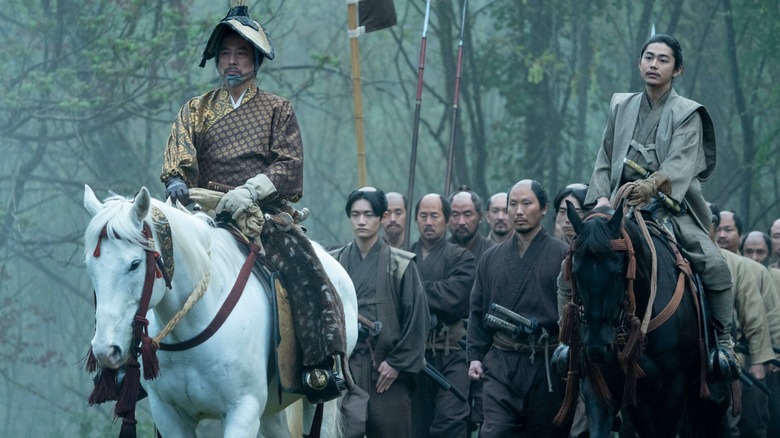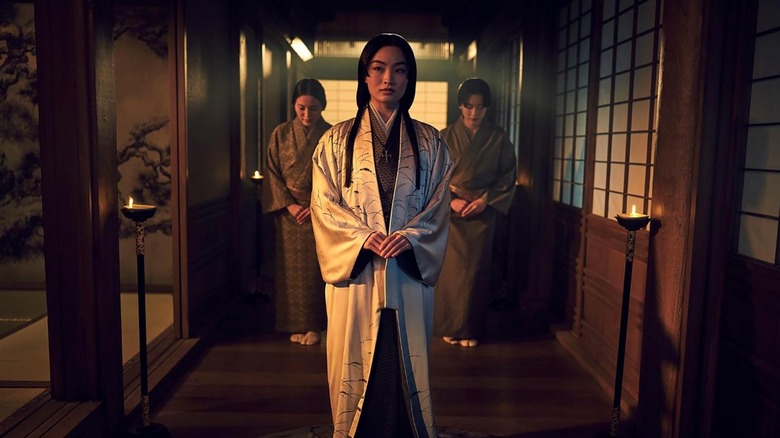The Complex Schemes And Alliances In The Shogun Premiere, Explained
This post contains spoilers for the first two episodes of "Shogun."
FX's "Shogun" sets up a premise grand and sweeping in scale, transporting us to feudal Japan during the late Sengoku period, a time when civil wars and social strife continuously plagued the nation. The source material for the limited 10-part series is James Clavell's 1975 novel "Shogun," a stunning, expansive work of historical fiction that spans more than 1,200 pages and details the fictionalized exploits of a real event. As the novel embeds real historical events with dramatic embellishments, there is a lot to dissect and absorb in terms of the socio-political clashes that took place during that time, which eventually led to the real-life Battle of Sekigahara, a turning point in 1600s Japan.
The "Shogun" premiere lays an impressive foundation for the semi-historical events to come, opening with the crew on the Dutch warship, Erasmus, who are on the verge of starvation after being stranded at sea for a long time. An English pilot, John Blackthorne (Cosmo Jarvis) — loosely based on navigator William Adams, the first Englishman to reach Japan — is aboard the ship and is adamant about carrying out the crew's assigned mission. However, with a dead captain and most of the crew rotting away due to starvation, John must persevere until they reach a land that feels strange and alien to him: Japan.
As we dive into the world of daimyos (Japanese feudal lords) and the death of Japan's supreme ruler, the Taiko, which presents a deadly power vacuum, things get a tad complicated in "Shogun," as the show takes the liberty to alter and shift around events from the book. Let us explore the historical backdrop of these shifting schemes and alliances, and how the show plays them out to dramatic effect.
The Council of Regents and Toranaga's plight in Shogun
"Shogun" imparts a personal tint to the events that grip the Castle of Osaka after the death of the Taiko, where a deadly clash ensues between Lord Toranaga (Hiroyuki Sanada) and four feudal lords: Ishido (Takehiro Hira), Kiyama (Hiromoto Ida), Sugiyama (Toshi Toda), and Ohno (Takeshi Kurokawa). All five are a part of the Council of Regents, which was formed by the Taiko before his death to ensure peace in the nation until his heir comes of age. This alliance had always been uneasy, especially with Toranaga and Ishido butting heads over conflicting political ambitions, and now, the council wants to vote for Toranaga's execution on the pretext that he has massively overstepped his bounds as daimyo.
To understand the complicated situation better, one must take a brief look into the real-life Council of Regents and the eventual collapse of the feudal system in Japan. Toranaga is based on daimyo Tokugawa Ieyasu, who led a battle against Ishida Mitsunari (Ishido in the show) and his loyalists, and this win led to the rise of the influential Tokugawa shogunate during the Edo period. The tense political clashes between Tokugawa and the rest of the Council were undoubtedly more complicated than in the show, but the key point of interest is that Tokugawa enlisted the help of William Adams, as the navigator's presence helped turn the tide of history.
In "Shogun," Toranaga is held hostage in Osaka after the Council schemes to kill him, although they have yet to cast an official vote in favor of that decision. Meanwhile, the Erasmus crashes on the Japanese shore, and John is subjected to the whims of the local samurai Omi and his uncle, Yabushige (Tadanobu Asano), who wishes to hide this development from Toranaga.
Why John Blackthorne is a bone of contention in Shogun
The vast cultural divide between Japan and England, along with xenophobic mutual ignorance, is on full display when John and his captors exchange insults and call each other "savages" while being violently wary of one another (a schism intensified by the language barrier). A Jesuit priest is brought to translate John's plea during his trial, but the former is a Portuguese Catholic, which clashes with John's Protestant sensibilities, as the Anglo-Spanish War is still in full swing. It is crucial to note that the Japanese are mostly unaware of the Protestant aspect of Christianity, as they are not acquainted with England's religio-political landscape and the increasingly colonial nature of the Catholic stronghold on Japan.
This brings us to the Macao incident, which is alluded to several times, especially concerning John's knowledge of it, which is seen as a threat by the Catholic members of the Regent Council, as well as the Portuguese Jesuit Order. It is also made amply clear that the Portuguese trade in Japan — along with the expansion of Catholicism in the nation — has directly made some Japanese daimyo extremely wealthy after their religious conversion. As everything hangs in the balance with John's uncharacteristic presence, there is an urgency to either imprison or kill him, but the schemes are thwarted after John tells Toranaga the truth on two separate occasions in the presence of Jesuit priest Father Martin (Tommy Bastow) and Lady Mariko (Anna Sawai), who act as translators.
John's alliance with Toranaga is so disastrous for the Portuguese Catholic forces (and the Japanese lords who are a part of the Order of the Jesuits) that an assassin is sent to kill him. However, Toranaga anticipates this and swiftly disposes of the intruder.
The Macao Incident and Toranaga's plan
John, who is dubbed Anjin (Japanese for pilot/navigator), constantly claims that he is not a pirate, even though his ship's logs prove otherwise and detail how he and his men pillaged Spanish settlements as a part of their mission. As someone who served a Dutch privateer ship, and looks to expose the Portuguese Catholics for his own ends as a Protestant emissary, John emerges as a figure with complicated motivations who sides with Toranaga as he is his only hope for survival. John explains that Spain and Portugal have divided the world map and aim to replace traditional Japanese lords with Catholic ones, as Japan "belongs" to them. Moreover, a secret army of Japanese Catholic ronin is gearing up for this military/political overthrow in Macao, and this revelation changes everything for Toranaga and the fate of the nation.
The Portuguese Catholics play a seminal role here in influencing events, as characters like Rodrigues (Nestor Carbonell) and Father Martin represent the faction's interests in maintaining trade relations by legal means amassed annually through Black Ship fleets in Macao. The Portuguese also supply Japan with contemporary military weapons and ammunition, which are being covertly used for the secret bases — although John's knowledge of warfare tactics would undoubtedly prove to be an advantage for Toranaga and those who wish to prevent Japan from being submerged in an all-out war against external and internal forces.
Initially, Toranaga intended to use John as a means to sow discord within the Council to Regents to delay the vote in favor of his execution. This works, as the Japanese Christian daimyos demand that John be executed before the vote is cast, which ends up benefiting Toranaga and his plans to protect himself and his people.
Shifting allegiances and conflicting ambitions
At one point, Mariko tells John that the Japanese believe that every person has three hearts — one in the mouth, which is a part of the soul for the world to know, one in the chest, reserved for close friends and confidants, and the third, secret heart, buried deep within. This cultural belief highlights the various aspects within a person's soul that manifest in conflicting allegiances. For instance, Mariko must serve Toranaga as her Lord, even though aiding John, a Protestant, goes against her Catholic beliefs, while Yabushige openly flits between serving Toranaga and Ishido as their situations evolve with time. Every individual, including John, has more than one heart, and their secret hearts remain hidden so far to be revealed when the time is right.
Most of the smaller or more intermediate players in the game, such as Omi or Yabushige, only look to increase the percentage of their fief or covet a certain province to expand their authority to a limited extent. The micro-level political machinations enforced here feed into the larger picture, culminating in the Council of Regents working together to remove a powerful member to retain and expand their respective ambitions. John is a wild card that further complicates the situation, as his mere presence exposes a long-gestating colonization scheme tangled with cultural perspectives of tradition, honor, and loyalty while introducing new political forces that remain hidden in plain sight.
In "Shogun," Toranaga has expressed disinterest in establishing his shogunate, stating that it is "a brutal relic of a bygone era." However, the rise of Toranaga as Shogun is inevitable, as is the violent political maneuvering and bloodshed that comes before and after.
The first two episodes of "Shogun" are now streaming on Hulu.
